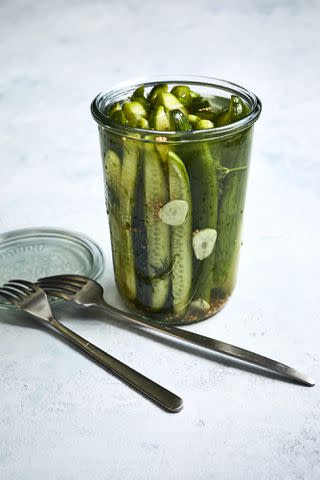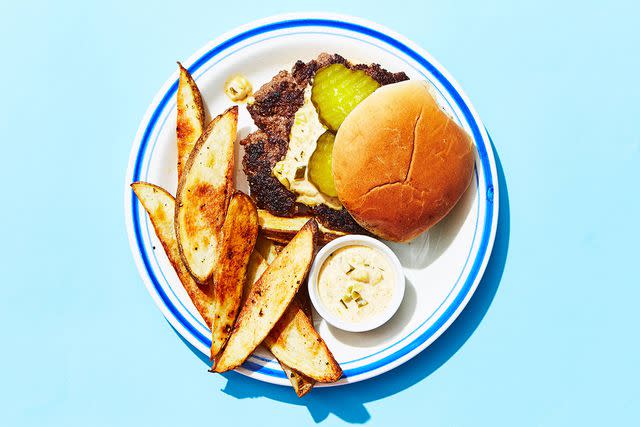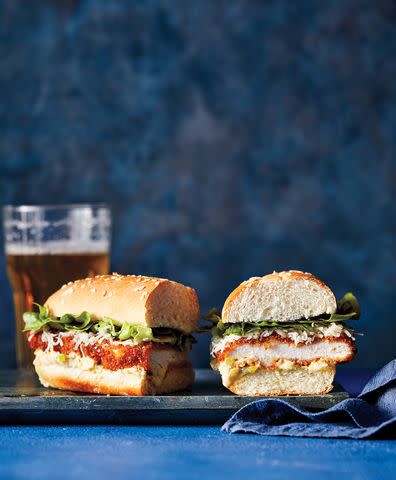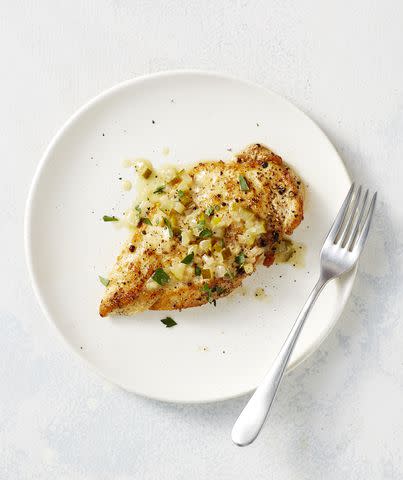Are Pickles a Gut-Healthy Snack?
And how do fermented foods impact our gut microbiome?
Fact checked by Haley Mades
It’s tough to resist the salty, tangy crunch of a pickle—the perfect addition to a sandwich, tuna salad, or straight from the jar. But considering the ties between gut health and pickled or fermented foods, does this classic burger topper count as a gut-healthy pick? We asked a registered dietitian to explain how fermented foods impact our gut microbiome, and whether pickles—and the way they’re prepared—are included as a good food for supporting the gut.
Meet the Expert
Amy Shapiro MS, RD, CDN, is a registered dietitian, nutritionist, and founder and director of Real Nutrition.
Are Pickles Healthy?
In short, the answer is yes and no, according to registered dietitian Amy Shapiro. "Pickles are a low-calorie food and rich in probiotics, which support a healthy balance of gut bacteria—a healthy gut microbiome is associated with improved digestion, reduced inflammation, and enhanced immune response," she says. "They offer many health benefits and are typically lower in sodium content than conventional pickles, however, they are high in sodium."
Pros
They're high in vitamins and minerals.
Vitamins K, C, and A.
But when it comes to micronutrients, like vitamins and minerals, pickles have a lot to offer. One cup of kosher or dill pickles provides up to 45 percent of your daily needs of vitamin K, which plays an important role in blood clotting and healthy bone formation. Pickles are also a good source of immune-boosting vitamin C, and vitamin A for eye health (and more).
Potassium
Pickles provide some potassium, a mineral that’s super-important for fluid balance in the body (potassium is an electrolyte, a category of minerals that support hydration, among other essential processes).
Fiber
Pickles are veggies, and all plant foods contain some fiber. This fiber helps maintain digestive regularity and can also aid in lowering cholesterol levels.
Cons
They're low in macronutrients.
The classic pickles we think of are made from cucumbers, so their nutrition profiles are quite similar. Cucumbers are full of plant compounds, including beta carotene, that are both potent antioxidant and anti-inflammatory agents. Pickles offer minimal value in the way of macronutrients, including protein, fat, and carbohydrates—the primary nutrients we need in the largest amounts—which translates to low-calorie content.
Pickles are very high in sodium.
A final micronutrient pickles deliver on—sadly, not in a good way—is sodium. Every day we need a small amount of sodium to carry out vital functions in the body. As a primary electrolyte, sodium plays a central role in fluid balance while also helping to transport oxygen and nutrients. However, we only need less than 500 milligrams (mg) of sodium per day to carry out these functions. Compare this to the 4,000 to 10,000 mg of sodium that many Americans consume each day.
Depending on a variety of factors, a typical sodium recommendation is somewhere between 1,500 and 2,500 mg of sodium per day. One cup of pickles contains a staggering 1,200 mg of sodium, putting a large dent in a typical daily allowance of salt (unfortunately, it’s part of what makes them so delicious). "Commercially-prepared pickles are high in sodium and excessive sodium intake can contribute to high blood pressure, heart disease, and other health issues," says Shapiro.
Because pickles contain minimal carbohydrates, some feel that they’re a great snack for those with diabetes or pre-diabetes, since they won’t cause a spike in blood sugars. However, considering the sodium content of this crunchy snack, and the fact that those with diabetes are at higher risk for heart disease and hypertension, that recommendation may not be all that sound.
and some store-bought pickles may also contain added sugars, artificial flavoring, preservatives, and other additives which can contribute to excess calorie consumption and reduce their potential benefits.
Can ruin your teeth.
Too much acidity isn't good for any part of your body, especially your teeth. "Pickles, especially made with vinegar, can also be acidic, which may erode tooth enamel over time," says Shapiro of the effects of pickles on oral health. This is, of course, when large quantities of pickles are consumed.
Not All Pickles Are Technically Fermented
You may have heard that pickled or fermented foods are extremely beneficial to our gastrointestinal (GI) health—so are pickles on this list of gut-healthy ingredients? It depends. One important, determining factor is how the pickle was made—mainly whether the pickle in question was made using the slow, natural process of fermentation (vs. being quick-pickled in a vinegar brine).
Fermentation is a preservation method that’s been utilized for thousands of years by civilizations all over the world, with evidence of its use dating as far back as 10,000 BCE. In technical terms, fermentation occurs when microorganisms, like bacteria, conduct metabolic processes that create desirable changes in a food or beverage. These changes could be improving flavor, shelf life, or health benefits. The bacteria that does the work during fermentation will remain in the food or beverage, so when you consume it, you’ll be getting a dose of healthy bacteria (which your own body loves).
Many pickles that you’ll find in the grocery store won’t be fermented and will rather be created using a brine—which means they don’t provide those good gut bacteria like fermented pickles do. A typical brine for pickles will include salt, vinegar, and water and may have additions of herbs, spices, and sugar. The salt and vinegar in the brine will offer preservation power and a tangy flavor, similar to fermentation, and the pickles themselves contain those micronutrients mentioned above, but not the additional live probiotics formed during true fermentation.
To figure out which grocery store brands make their pickles via fermentation, and which have been brined in vinegar (which is technically fermented, but does not contain probiotics), check the label for ingredients and any messaging that describes their pickling method. Seeing "vinegar" on the ingredient list is often a good indicator that they aren't fermented, but pickled, getting their sour snap from the acidic vinegar, salt, and other flavorings. Whereas some jars, like Krüegermann's Naturally Fermented Dills and Bubbies Kosher Dill Pickles, will proudly boast their slow-fermentation process with probiotics and/or won't have vinegar listed as an ingredient. These pickles develop their tangy tartness due to microbe activity that is the result of the process of fermentation.
Why Fermented Foods Help Fuel Gut Health
The gut microbiome is a group of over a trillion microorganisms that live in our intestinal tract. These microorganisms—mainly including bacteria, but also some fungi and viruses—play a vital role in digestion as well as the absorption and creation of nutrients in the body. You may be familiar with the other name for these healthy bacteria for our gut health: probiotics. Many fermented foods are natural sources of live probiotics, which help restore or maintain the health of our gut microbiome. (Not all fermented foods and drinks contain probiotics though vinegar, alcohol, and baked sourdough bread do not, for example.)
Related: Your Gut Needs Prebiotics and Probiotics—But What's the Difference?
However, increasing evidence shows that the gut microbiome supports far more than just our digestion and metabolism. One amazing process that the biome facilitates is what’s called the gut-brain axis through a variety of different pathways. This translates to the microbiome’s influence, either positive or negative (depending on its health), on mood and a variety of mental health disorders, including anxiety and depression.
It has also been found that the gut microbiome is involved in the expression of a variety of chronic diseases, including rheumatoid arthritis, eczema, type 1 and 2 diabetes, asthma, inflammatory bowel disease, irritable bowel syndrome, heart disease, liver disease, and kidney disease. Plus, fermented foods are great immune boosters as they have natural antioxidant, anti-inflammatory, anti-microbial, and antifungal benefits. And this exciting research is just getting started.
How to Ferment Pickles
If you're looking to ferment your own pickles, Shapiro suggests following the below steps:
Step 1 Rinse Cucumbers
Rinse cucumbers, and leave whole or slice them
Step 2 Make a Brine
In a clean glass or container (typically a mason jar), dissolve 2 to 3 tablespoons of salt into 4 cups of filtered water. Stir until dissolved.
Step 3 Add Cucumbers to Jar
Pack the cucumbers tightly in the container and cover with the brine, ensuring they are fully submerged. Add optional garlic cloves or whole spices.
Step 4 Cover and Store Container
Cover container with a cloth or paper towel secured with a rubber band (allows airflow while preventing debris from entering). Then, place container in a cool, dark area away from sunlight for about 1 to 2 weeks depending on preferred taste and texture.
Step 5 Check Pickles
Check pickles periodically and skim off any foam that appears on the surface. After a few days, start tasting the pickles to see if you like their flavor and texture.
Step 6 Transfer to Fridge
Once you like how they taste, transfer pickles to the fridge to slow the fermentation process. Store pickles in the fridge for several weeks to several months with a label on the date they were pickled.
Easy Recipes With Pickles
Day Dill Pickles

There are few things more satisfying to pickle lovers than the crunch of a pickle. If you're craving a dill pickle, you can whip up a batch in less than five minutes. Vinegar, sweet onion, garlic, dill, and sugar all combine to make the simple cucumber a perfect pickle.
Smash Burgers and Oven Fries

No matter how you like your burger, you can always be sure to find a pickle or two tucked under the bun. This recipe features chopped bread and butter pickles in a creamy burger sauce and atop a juicy beef patty.
Crispy Chicken Sandwiches With Pickle Dijon

The humble chicken sandwich gets an instant upgrade with the addition of pickled relish. Combined with mayonnaise and Dijon mustard, this tangy creamy spread hits all the flavor notes.
Chicken Pickle Piccata

You may think that pickles only belong on chicken sandwiches, but this pickle butter sauce will have you think twice. Pickles and chopped shallots provide the crunch and butter makes the chicken even more moist with every bite.
Related: 8 Everyday Ways to Improve Your Gut Health Naturally
For more Real Simple news, make sure to sign up for our newsletter!
Read the original article on Real Simple.


